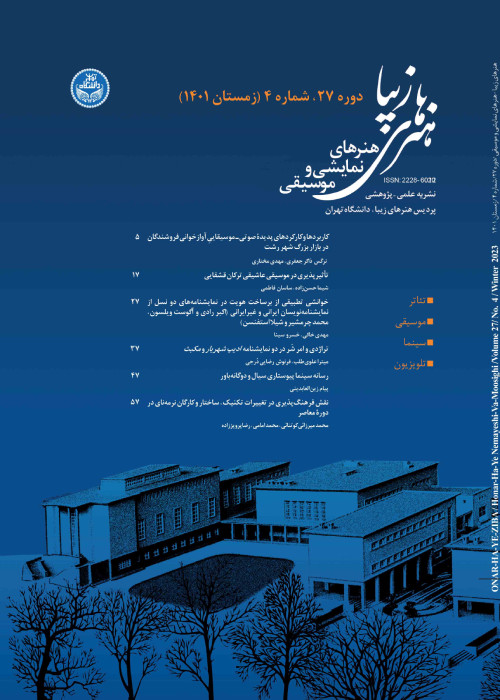The Problematic concept of
Author(s):
Abstract:
"Tashabboh" (becoming similar) is one of the controversial concepts through the process of dramatization of Karbala events. Kal?m is the Islamic philosophy of seeking Islamic theological principles through dialectic. This concept has a root in "K?lam", Theosophy and Jurisprudence in particular, and when it comes to "Tazieh" (it means condolence. The term ‘Ta?ziyeh’ is used in Iran for all sorts of mourning rituals, including the performance of the fully fledged Ta?ziyeh passion plays), Tashabboh can be discussed from three points of view: 1- "Tashabboh" has a deep connection with the process in which "Tazieh" has been named "Shabih-Khani". 2- Different stances of "Tashabboh" – like considering someone similar with Imams, or with impious and enemies of Imams, or assimilating a man to a woman- are juratory controversials that have been appeared in "Tazieh" as well. 3- The importance of "Tashabboh" for jurisconsults leads them to issue variety of diverse indults. These indults on the other hand, have clear effects on the method of "Shabih-khani". The quality of “Shabih-khani” relies on Fatwa. It is a religious judgment issued by a great Ayatollah. This paper wants to consider relation between Fatwa and quality of “Shabih-khani”. The Islamic high clergy have two kinds of contact to "Tazieh". On the one hand, they did not approve of the Ta’ziyeh, or any other theatrical presentation, On the other hand, the clergy were unable to ignore the popularity of the Ta’ziyeh and recognized that these performances had a profound effect on the people. In this article, it's been tried to scrutiny these three points, considering the knowledge and culture in which both "Shabih-khani" and the concept of "Tashabboh" have been derivated and extracted from. This approach stands against those approaches that conceive and analyze "Tazieh" with the Conventional Western Theatre. We can’t identify "Tazieh" with "Mimesis". Mimesis is a Greek word. Its persistence as such within English-speaking cultures is significant. For it has no fixed, reliable or agreed English equivalent. We can find it associated with the following English words: imitation, representation, copy, similarity, fake. On the other hand "Tashabboh" associated with the following Persian words: becoming similar, assimilating, considering similarity, comparison. Mimesis isn’t correct term for mimetic processes in kinds of Iranian traditional theatre, particularly "Shabih-Khani". In Ta’ziyeh, acting is not mimetic and entirely suggestive, with a full contractual agreement, performatively stipulated, between the actors and the audience that they are just acting. Actors hold their script in their hands, they want to gesture a distance and suggest a dissimilitude. If the Aristotelian mimesis is based on similitude, Ta’ziyeh is predicated on dissimilitude. The style of acting in "Tazieh" show that "Shabih-Khan" (actor in Tazieh) is a narrator. He narrate story of Karbala. He don’t play role, because in tradition of "Tazieh" actor don’t allow to role playing. Now "Tashabboh" is defines our way of thinking about "Tazieh". This paper has not linguistic approach. The concept of Tashabboh in this approach only reduces to simple word. But archeological approach helps us to better understanding "Tazieh", Shi’i passion play.
Language:
Persian
Published:
Honar-Ha-Ye-Ziba: Honar-Ha-Ye Mosighi Va Namayeshi, Volume:14 Issue: 39, 2010
Page:
45
magiran.com/p924733
دانلود و مطالعه متن این مقاله با یکی از روشهای زیر امکان پذیر است:
اشتراک شخصی
با عضویت و پرداخت آنلاین حق اشتراک یکساله به مبلغ 1,390,000ريال میتوانید 70 عنوان مطلب دانلود کنید!
اشتراک سازمانی
به کتابخانه دانشگاه یا محل کار خود پیشنهاد کنید تا اشتراک سازمانی این پایگاه را برای دسترسی نامحدود همه کاربران به متن مطالب تهیه نمایند!
توجه!
- حق عضویت دریافتی صرف حمایت از نشریات عضو و نگهداری، تکمیل و توسعه مگیران میشود.
- پرداخت حق اشتراک و دانلود مقالات اجازه بازنشر آن در سایر رسانههای چاپی و دیجیتال را به کاربر نمیدهد.
In order to view content subscription is required
Personal subscription
Subscribe magiran.com for 70 € euros via PayPal and download 70 articles during a year.
Organization subscription
Please contact us to subscribe your university or library for unlimited access!


